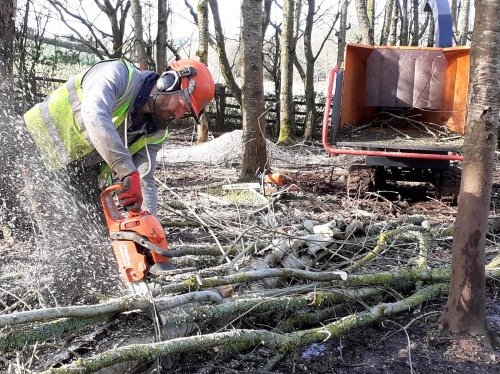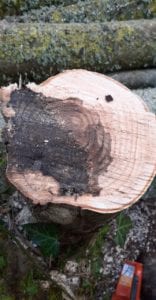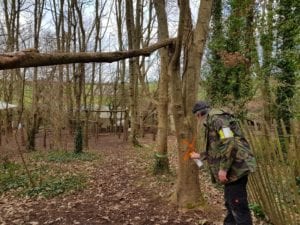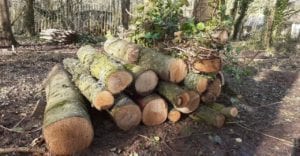
The sad truth is that our beloved woodland at Shillingford, our first home and site of many years of forest school hijinks, has no future as an ash woodland. Last week I met our Estates Manager, Rob (AKA Minty or Bert), and he talked me through the disease blighting our trees and how we’re going to manage the situation to keep the woodland alive, thriving and sustainable for the next generation.
 Ash Dieback
Ash DiebackMany of us have heard of ash dieback, the prevalent tree disease affecting ash trees around the UK and Europe. Ash Dieback (or to give it its scientific name; Hymenoscyphus fraxineus) is a fungus which originated in Asia. Whilst it doesn’t cause damage to trees within its native range, ‘its introduction to Europe about 30 years ago has devastated the European ash (Fraxinus excelsior) because our native ash species did not evolve with the fungus and this means it has no natural defence against it.’ (source: Woodland Trust.) The spores from this fungus can blow many miles away, making it hard to isolate to one area or to prevent.
Unfortunately our woodland at Shillingford is largely comprised of ash and there is no way of saving the majority of the trees within the space. Therefore, a large amount of felling is needed as we pre-empt the death of these trees. Not only this, but there is a safety issue here because as the fungus continues to attack its host, branches will die and become hazardous as they could fall onto those using the woods below.
 The Process
The ProcessWhen I spoke to Rob he was in the process of marking the trees destined to be felled. He spoke of the sadness of this task, at the reluctance of having to choose which trees will go and the harshness of the vast quantity of affected trees. Once marked up, the trees are cut down (in fact this is happening as we type whilst half term means an empty woodland) before some of the stumps are ground down. The final stage will be the planting of new trees which will happen next month as Spring appears. We will be replanting a diverse mix of native species, hardy to tree disease and suitable for the geographical location. This should ensure a healthy woodland for many many years to come.
However, it’s not all bad news. Not only are we replanting with a mix of new trees to replace the dying trees we’ve removed but we won’t be wasting them. Some of the trees will go through the wood chipper to provide wood chip for our paths and some will be cut into firewood for the seasons to come. This will help control the spread of the disease as we keep it on site as well as being a sustainable approach to use up any waste.
Rob also informed me that this felling doesn’t actually completely kill the trees. We are employing the traditional woodland management approaches of coppicing and pollarding. This means that some of the trees will be cut to either ground level or above animal grazing level and that the trees will grow back. Within 2-3 years, there will be a ‘lollipop’ affect on many of these stumps with a low, broad level of foliage. Not only is this a sustainable method of managing woodland as it opens up lower levels to light and promotes future growth, it also mitigates the sadness of the job in hand.
 Looking Forward
Looking ForwardFor many involved in this process, this can be a sombre and undesirable task. But to quote The Lorax in the movie inspired by Dr Seuss’ beloved book, ‘it’s not about what it is, it’s about what it can become‘. And whilst this is not a pleasant job for our estates team to be doing, I hope that they will take comfort in knowing that with the planting next month, we are helping to create something even better. A woodland that will stand the test of time and that will be there when we’re long gone, still welcoming young and old alike to come and explore the natural treasures it has to offer.
Author: Hannah Durdin, Forest School Leader & Administrator
Date: Friday 19th February 2021
Copyright © Outdoors Group Ltd 2021. All Rights Reserved.
Registered Office: The Outdoors Group, Western Lodge, Crediton, Devon, EX17 3NH. Company number 10755829
Terms & Conditions / Website Terms / Privacy Policy / Sitemap / Built with ♥ by Solve